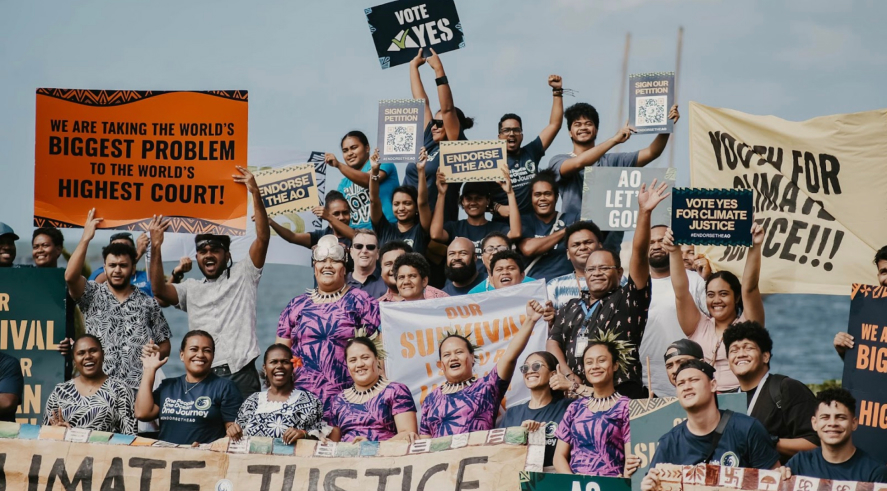About The witness stand
Who we are, what inspired us and what we’re fighting for.
oUR MISSIOn

The International Court of Justice (ICJ) has received submissions from states and approved international organisations on the advisory opinion on the obligations of states in relation to climate change. In this process, it is vital that the voices of marginalised groups, children, young people, women, persons with disabilities, and frontline communities be heard as this historic process unfolds.
The Witness Stand is a program that the PISFCC and its partners have initiated to hear from climate witnesses from around the world and to make the ICJ proceedings more inclusive and representative. It will ask individuals what their message would be to the World’s Highest Court as it considers the question of climate change.
Who we are
PACIFIC ISLANDS STUDENTS FIGHTING CLIMATE CHANGE (The Pacific)

The PISFCC is a youth-led organisation whose members are students from the Pacific Island countries.
PISFCC began in March 2019 when 27 University of the South Pacific Law students from 8 Pacific Island countries decided to join together to begin a campaign to persuade the leaders of the Pacific Island Forum to take the issue of climate change and human rights to the International Court of Justice.
The core campaign is to seek climate justice at the International Court of Justice by requesting the court to respond to a legal question that will develop international law, integrate legal obligations around environmental treaties and basic human rights, and clarify state responsibility for climate harm.
The PISFCC is also committed to educating and activating all Pacific island youth to become aware and take action to help prevent and fight against climate change.
World’s Youth for Climate Justice (The Hague/Global)
The World’s Youth for Climate Justice is the international arm of the PISFCC.
The foundation of the work of World’s Youth for Climate Justice (hereafter “WYCJ”) aims to encourage, uplift, motivate, highlight, complement, and inspire action and commitment to climate justice and intergenerational equity. The WYCJ are partners with the PISFCC in the essential pursuit of Climate Justice at the ICJ.
NOT JUST CELSIUS (Germany)
NOT JUST CELSIUS makes the first ever climate proceedings at the International Court of Justice (ICJ) accessible to a broader public. Through media, art and data science, NOT JUST CELSIUS engages with audiences in both physical and digital spaces.
NOT JUST CELSIUS is a project of the Interactive Media Foundation. The Interactive Media Foundation is a Berlin-based non-profit organization dedicated to creating impactful narratives on socially relevant topics. The Interactive Media Foundation believes that appreciation, responsiveness, cooperation and diversity are the basis of social cohesion.
UNDERSTANDING OUR INSPIRATION
Our project draws inspiration from the rich tapestry of symbols and patterns found in art prints across the Pacific region. These motifs serve as more than mere adornments; they are vessels of narrative, carrying the tales of the Pasifika people from generation to generation.





Through our work, we aim to bring these stories to the forefront, placing them on the witness stand of climate change. Each motif we utilize bears its own narrative, intricately woven into the fabric of Pasika heritage. From symbols of resilience to patterns depicting the rhythms of daily life, these motifs serve as silent storytellers, speaking volumes about the experiences and values of the Pacific community. By delving into their meanings and origins, we uncover a wealth of cultural wisdom and identity.
It’s important to note that while we draw upon these motifs to convey the stories of the Pasika people, we do not claim ownership of them. Instead, we see ourselves as custodians, entrusted with the task of respectfully sharing these cultural treasures with a wider audience. Our approach is one of reverence and humility, recognizing the motifs as an integral part of Pacific identity and history